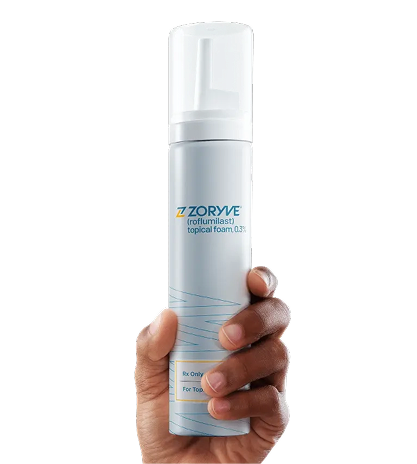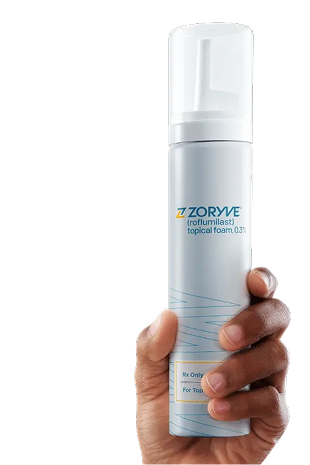Pivotal Safety
CONSISTENTLY WELL
TOLERATED AND SAFE


SAFE FOR ANY LOCATION1,2
Low rates of stinging or burning (1.3%)3*
Not associated with atrophy, striae, dyspigmentation, folliculitis, and/or contact dermatitis1
Low rate of discontinuation due to adverse events (0.9%)4,5
*Low rates of hot, tingling/stinging sensation reported in STRATUM patient-rated tolerability assessments 10–15 minutes after first application: 1.3% with ZORYVE (n=304) vs 1.3% with vehicle (n=152).
ZORYVE is for topical use only and not for ophthalmic, oral or intravaginal use.1
| Adverse reactions reported in ≥1% of patients treated with ZORYVE foam for 8 weeks1† | ZORYVE foam (N=458) | Vehicle foam (N=225) |
|---|---|---|
| Nasopharyngitis | 7 (1.5%) | 1 (0.4%) |
| Nausea‡ | 6 (1.3%) | 0 (0.0%) |
| Headache | 5 (1.1%) | 0 (0.0%) |
†Based on pooled safety data from Trial 203 and STRATUM studies. Diarrhea and insomnia were reported in fewer than 1% of patients treated with ZORYVE.
‡All incidences of nausea with ZORYVE were mild, the majority were transient and resolved without intervention, and none led to study discontinuation.6
OPEN-LABEL LONG-TERM SAFETY STUDY
The adverse reaction profile and efficacy results were consistent with STRATUM for up to 52 weeks of treatment1,2§
§A Phase 2, open-label safety trial was conducted in patients (aged ≥ 12 years) with at least moderate seborrheic dermatitis who successfully completed a prior ZORYVE foam trial (n = 133) and in patients naïve to ZORYVE and vehicle foam (n=267). Patients applied ZORYVE once daily to all active seborrheic dermatitis lesions, including any new lesions that developed during the study, unless otherwise instructed by the investigator, for up to 52 weeks. The primary endpoint was occurrence of adverse events and serious adverse events. Safety and tolerability were also assessed. Efficacy measures were included as secondary endpoints and are reported as observed cases.2,6

